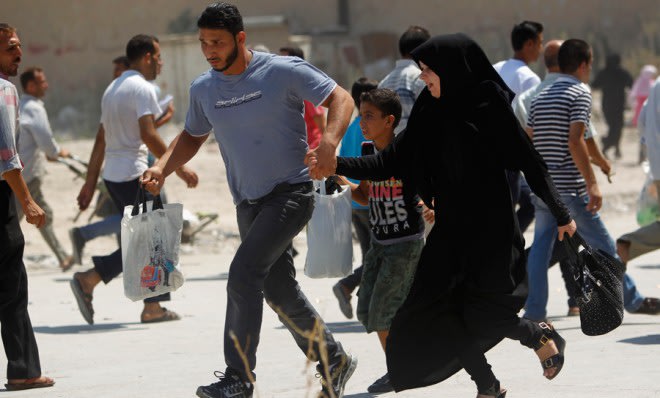
Is anyone coming to the rescue?
by: Harold Maass
Don't hold your breath for an international response to the alleged atrocity
The Syrian opposition's claim that government forces used poison gas to massacre more than 1,000 people could mark a turning point in the international community's response to the country's two-year civil war — but only if investigators can prove it.
France on Thursday called for a "reaction with force" if investigators verify the report, which was supported by horrific videos showing rows of corpses. President Obama previously called the use of chemical weapons a "red line" that would justify greater foreign intervention in the conflict. And on Wednesday, an Obama administration official said, "There are strong indications there was a chemical weapons attack — clearly by the government."
However, the official warned that the U.S. and its allies must "do our due diligence and get all the facts" before formulating a response. That won't be easy, though, and critics frustrated with Obama's hands-off policy toward Syria fear that the obstacles to collecting definitive proof could prevent an international reaction to what would be the deadliest chemical-weapon attack yet in Syria.
The Syrian government says the charge is "absolutely baseless," and it still has allies at the United Nations capable of providing the regime of President Bashar al-Assad with crucial cover. Colum Lynch at Foreign Policy notes that, at an emergency Security Council meeting late Wednesday, Russia and China managed to water down a resolution about Syria so thoroughly that it didn't even mention this attack directly. A tougher draft circulated by the U.S. would have called on Syria to give U.N. inspectors already in the country immediate access to the scene of the attack, but it never made it to a vote. The final draft merely called for clarity on the issue of chemical weapons, Lynch says, and "Syria's cooperation appears unlikely."
Assad's forces provided proof of that quickly enough. Syrian activists said Thursday that Assad's forces were continuing their offensive in the rebel-held eastern suburbs of Damascus, where the alleged chemical-weapon attack occurred, further cutting the area off from outside observers.
The protection offered by Russia and China at the U.N., as well as a few more days of bombing, might be all it takes to prevent a definitive confirmation of the rebels' accusations. Frank Gardner at BBC News says Assad's government, backed by Russia, insists that the area is unsafe as long as the fighting continues, so there's only a slim chance U.N. inspectors will be able to reach the site in time to make a clear call.
If an agent such as sarin has been used,
the U.N. team would need to get to the site within days before traces
become so faint as to be inconclusive. And if, as the opposition claims,
it was a government attack, then a delay of days or weeks would give it
enough time for forensic evidence to become controversial and for
evidence of munitions used to be removed. The Syrian government insists
it was the rebels who carried out the attack. [BBC News]
The international response to Syria may indeed be approaching a turning
point — but one that favors Assad rather than the rebels. There was only
a muted outcry after Egypt's military last week killed hundreds of
Islamists demanding the reinstatement of the country's elected
president, so Assad may be right in assuming that the enthusiasm for the
Arab Spring has waned to the extent that he can get away with almost
anything.
The writing has been on the wall for months, suggests The Washington Post in an editorial.
After all, the U.S. balked at taking decisive action at the first
reports of smaller chemical-weapon attacks in the spring, and the Obama
administration's promise two months ago to begin sending the rebels
military supplies has yet to be fulfilled. The U.S. should use its own
resources to determine what happened, the Post says, and retaliate accordingly.But don't count on that happening. "What we saw in Egypt signals that America has changed its mind and has backed away from the Muslim Brotherhood and all these Islamic groups," Syria expert Joshua Landis tells National Journal. "And the Syrian rebel groups are to the right of the Muslim Brotherhood."
As Michael Hirsh puts it at National Journal, "Advantage, Assad."
No comments:
Post a Comment